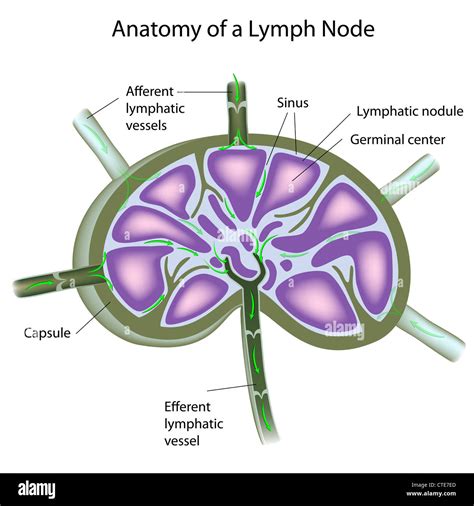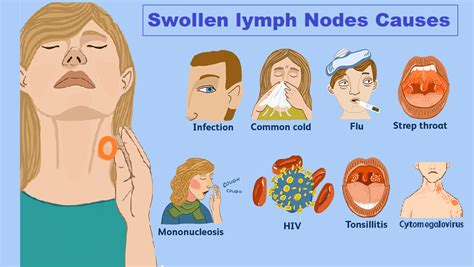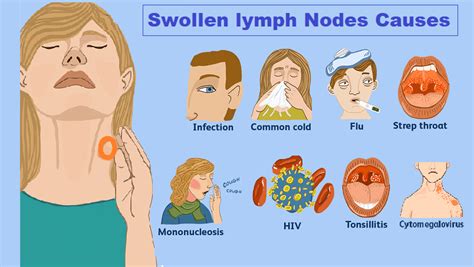Intro
Discover causes and treatments for swollen lymph glands, including infection, cancer, and autoimmune disorders, and learn about symptoms, diagnosis, and remedies to reduce swelling and promote lymph node health.
The human body is a complex system, and sometimes it can be overwhelming to understand what is happening when we experience unusual symptoms. One common issue that many people face is swollen lymph glands, also known as swollen lymph nodes. This can be a cause for concern, as it may indicate an underlying health issue. In this article, we will delve into the world of swollen lymph glands, exploring what they are, why they become swollen, and what it might mean for our overall health.
Swollen lymph glands can occur in various parts of the body, including the neck, armpits, and groin area. They are an essential part of our immune system, helping to fight off infections and diseases. When lymph glands become swollen, it can be a sign that our body is responding to an infection or illness. However, it is essential to understand that swollen lymph glands can also be a symptom of more severe conditions, such as cancer or an autoimmune disorder.
The lymphatic system is a network of vessels, organs, and tissues responsible for defending the body against infection and disease. It helps to remove waste and toxins from the body and plays a crucial role in maintaining our overall health. When the lymphatic system is functioning correctly, it helps to keep us healthy and free from illness. However, when it becomes compromised, it can lead to a range of health problems, including swollen lymph glands.
What are Lymph Glands?

How do Lymph Glands Work?
Lymph glands work by filtering lymph fluid, which is a clear liquid that circulates throughout the body. As lymph fluid passes through the lymph glands, it is filtered, and any harmful substances are removed. The lymph glands then produce immune cells, which are released into the bloodstream to help fight off infections and diseases. When the lymph glands detect an infection or illness, they become swollen as they work to produce more immune cells to combat the problem.Causes of Swollen Lymph Glands

Symptoms of Swollen Lymph Glands
The symptoms of swollen lymph glands can vary depending on the underlying cause. Some common symptoms include: * Swelling or enlargement of the lymph glands * Pain or tenderness in the affected area * Redness or inflammation of the skin over the affected area * Fever or chills * Fatigue or weakness * Weight loss or loss of appetiteDiagnosing Swollen Lymph Glands

Treatment Options for Swollen Lymph Glands
The treatment for swollen lymph glands depends on the underlying cause. Some common treatment options include: * Antibiotics to treat bacterial infections * Antiviral medications to treat viral infections * Anti-inflammatory medications to reduce swelling and pain * Immunosuppressive medications to treat autoimmune disorders * Surgery to remove cancerous lymph glandsPreventing Swollen Lymph Glands

Managing Swollen Lymph Glands
If you are experiencing swollen lymph glands, there are steps you can take to manage your symptoms. Some tips include: * Applying warm compresses to the affected area to reduce swelling and pain * Taking over-the-counter pain medications, such as acetaminophen or ibuprofen * Getting plenty of rest to help your body fight off the underlying infection or illness * Staying hydrated by drinking plenty of fluids * Avoiding strenuous activity to reduce strain on your bodyComplications of Swollen Lymph Glands

Seeking Medical Attention
If you are experiencing swollen lymph glands, it is essential to seek medical attention to determine the underlying cause. A doctor can provide a proper diagnosis and treatment plan to help manage your symptoms and prevent complications.What are the common causes of swollen lymph glands?
+Swollen lymph glands can be caused by infections, autoimmune disorders, and cancer. Some common causes include viral infections, bacterial infections, fungal infections, and autoimmune disorders such as rheumatoid arthritis or lupus.
How are swollen lymph glands diagnosed?
+Swollen lymph glands are typically diagnosed through a physical examination and medical history. A doctor may also order diagnostic tests, such as blood tests, imaging tests, or biopsy, to help determine the underlying cause.
What are the treatment options for swollen lymph glands?
+The treatment for swollen lymph glands depends on the underlying cause. Some common treatment options include antibiotics, antiviral medications, anti-inflammatory medications, and immunosuppressive medications. In some cases, surgery may be necessary to remove cancerous lymph glands.
Can swollen lymph glands be prevented?
+While it is not always possible to prevent swollen lymph glands, there are steps you can take to reduce your risk. Practicing good hygiene, getting vaccinated against common infections, avoiding close contact with people who are sick, eating a healthy diet, and getting regular exercise can all help to boost your immune system and reduce your risk of swollen lymph glands.
What are the complications of swollen lymph glands?
+In some cases, swollen lymph glands can lead to complications, such as infection or abscess formation in the lymph gland, cancer or lymphoma, autoimmune disorders, and lymphedema. It is essential to seek medical attention if you are experiencing swollen lymph glands to determine the underlying cause and prevent complications.
In conclusion, swollen lymph glands can be a cause for concern, as they may indicate an underlying health issue. By understanding what lymph glands are, how they work, and what causes them to become swollen, we can take steps to reduce our risk and manage our symptoms. If you are experiencing swollen lymph glands, it is essential to seek medical attention to determine the underlying cause and receive proper treatment. By taking control of our health and seeking medical attention when necessary, we can help to prevent complications and maintain our overall well-being. We invite you to share your thoughts and experiences with swollen lymph glands in the comments below, and to share this article with anyone who may be experiencing similar symptoms.
